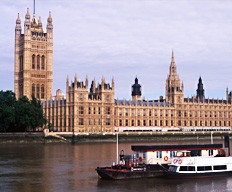Britain creates 'National Trust' to privatise waterways
by RYA on 16 Oct 2010

British Parliament privatises its waterways RYA
http://www.rya.org.uk
The announcement by the Cabinet Office that British Waterways will be replaced with a new civil society body builds on recommendations by British Waterways for the establishment of a ‘National Trust’ for the waterways, as waterway minister, Richard Benyon MP, explains:
'Our waterways are a cherished feature of the British landscape and a source of joy to many. Transferring British Waterways from Government to a charitable body will give users of the waterways; boating, walkers, anglers, kayakers etc. a greater say in their future management and help to ensure they remain a wonderful part of our natural and cultural heritage of value to society and the economy.
Engagement of communities
‘This change reflects the confidence we have that the engagement of local communities and interest groups will ensure the success of this transfer to civil society, building on the good work of British Waterways and countless waterways enthusiasts.'
'It’s a great example of Government giving power back to the people.’
Gus Lewis head of legal and government affairs comments: ‘The RYA is broadly supportive of the move provided that the governance structure of the new organisation is robust and that there is comprehensive stakeholder engagement. In addition it is vital that the new organisation has the financial stability and security that it will require in order to be effective.
‘We will be working closely with Defra (Department for Environment Food and Rural Affairs) officials and BW (British Waterways) in an effort to ensure that the long-term sustainable future of British Waterways navigations is safeguarded.’
Background
In the 50 years since British Waterways was established, the waterways have evolved from a moribund industrial transport system into a thriving environmental and leisure resource.
British Waterways’ 2,200-mile network of historic canals, rivers and docks is visited by 13 million people a year and now delivers an annual half a billion pounds in benefits to the nation, from amenity, flood relief and employment to green infrastructure, neighbourhood renewal and wildlife corridors.
Caring for this 250-year old working heritage requires intense management and significant funding, some of which are restricted by British Waterways’ 50-year old governance structures.
Radical proposals
Last year therefore (May 2009) British Waterways put forward radical proposals for a rethink of how the nation cares for its historic canals and rivers, taking British Waterways out of direct state control and into the third sector.
The Government responded on 21 June 2010 by announcing that it would explore the potential for transferring British Waterways and the Environment Agency’s canals and rivers into a new charitable body as part of a coherent vision for the Government grant-aided inland waterways of England and Wales.
As well as increasing stakeholder and public engagement, moving the waterways into the charitable sector creates greater opportunities to put them on a firmer financial footing.
Future funding will come from a combination of: a guaranteed, long-term contract from Government; commercial income (such as receipts from a charity-locked property endowment, boat licences and utilities), and growing charitable income (e.g. donations and legacies).
The future
Allowing for due diligence, the Government intends to have the new body up and running by April 2012. Work will now continue to develop the governance model, funding contract and transitional arrangements of the new body.
Defra will further explore whether the Environment Agency’s navigations should be included and will discuss with the Scottish Government the options around the Scottish waterways, which are devolved to Scotland, including their potential inclusion in the new charity.
British Waterways will work with Defra officials and waterway stakeholders to ensure good continuity, a smooth transition and a successful launch for the new body.
For more information, please go to: www.rya.org.uk
If you want to link to this article then please use this URL: www.sail-world.com/75864